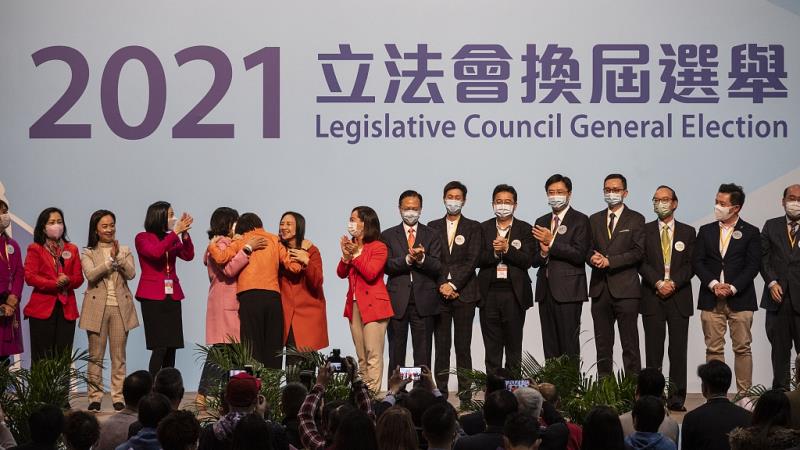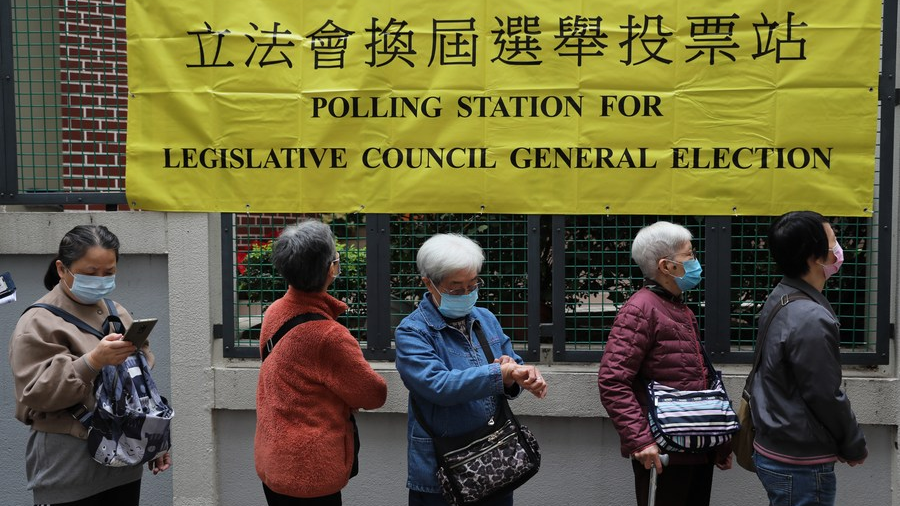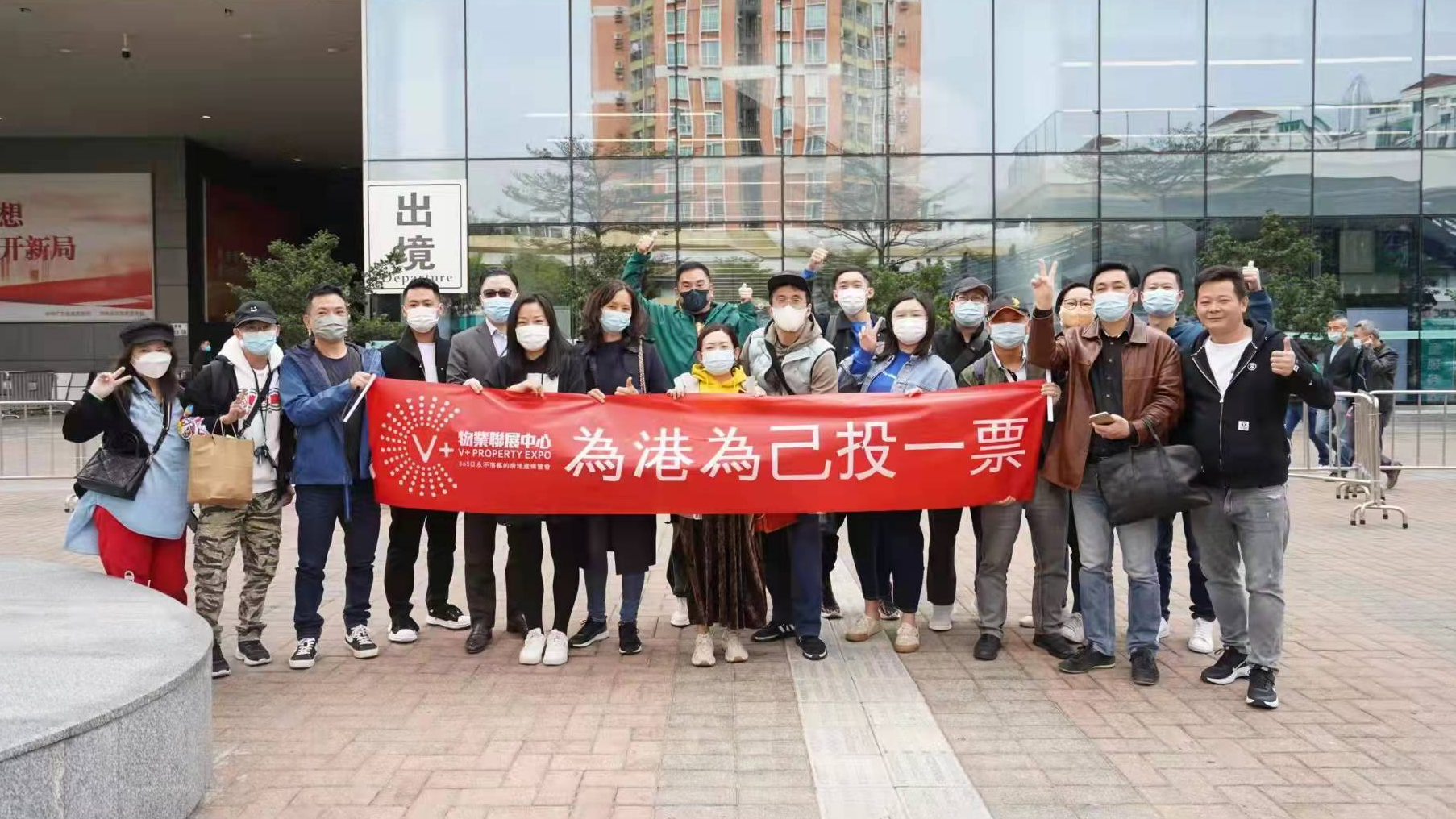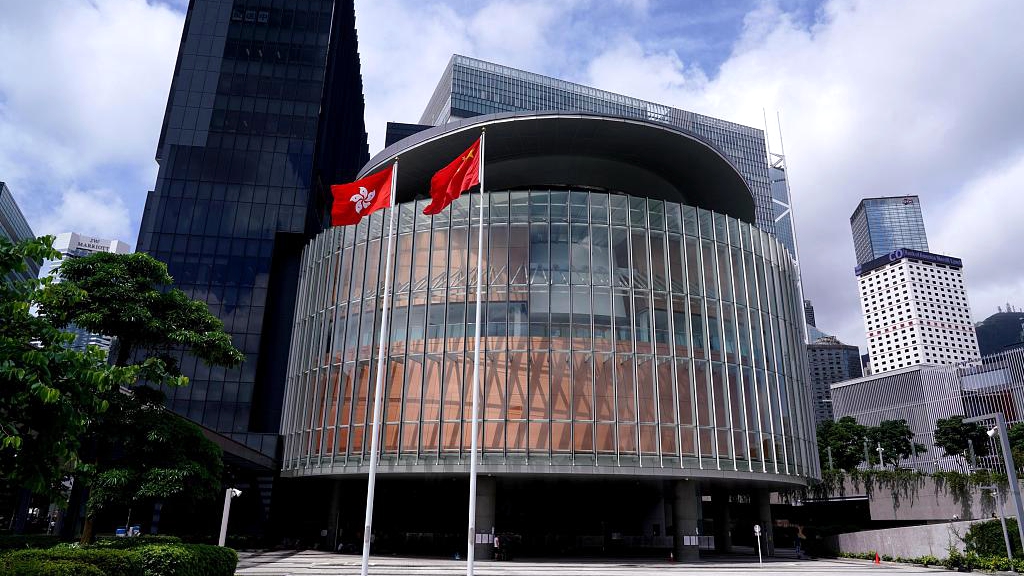
Elected candidates celebrate following the Legislative Council election in Hong Kong, China, December 20, 2021. /CFP
Elected candidates celebrate following the Legislative Council election in Hong Kong, China, December 20, 2021. /CFP
China's Hong Kong Special Administrative Region (HKSAR) held the seventh-term Legislative Council (LegCo) election, and 90 legislators were elected last Monday.
In the election, 153 nominated candidates competed for 90 seats, spanning geographical constituencies, functional constituencies and the Election Committee constituency.
The total number of seats in the LegCo grew by 20, aiming to cover broader opinions. Also, 20 seats from 10 geographical constituencies were directly elected by Hong Kong residents.
Voting in Hong Kong
Liang Haiming, also known as Leung Hoi-ming, one of the first voters at a polling station in southeastern Hong Kong, cast his ballot before breakfast.
Posting in a feed on WeChat, China's social media platform, he called on his friends to vote to elect a legislature that upholds the principle of "One Country, Two Systems" and solve the real problems in the city's development and people's livelihood.
Born on the Chinese mainland, Liang grew up in Hong Kong and was trained as an economist. "If the legislature can work more closely with the government to deal with social and economic issues in Hong Kong, the city will regain its vigor quickly," said Liang, who is chairman of a Hong Kong-based think tank China Silk Road iValley Research Institute and dean of the Belt and Road Research Institute at Hainan University.
He said many cooperative projects with the mainland were delayed by obstructions in the LegCo in recent years, and Hong Kong needs to get back on track quickly.

Voters wait to cast their ballot at a polling station in Wan Chai of Hong Kong, China, December 19, 2021. /Xinhua
Voters wait to cast their ballot at a polling station in Wan Chai of Hong Kong, China, December 19, 2021. /Xinhua
Over 1.3 million people cast ballots across 630 polling stations in this year's LegCo election, making the turnout rate 30.2 percent, lower than the 58.2 percent in 2016.
"It takes time for people to accept the new electoral system. Some people who didn't vote for so-called political reasons fail to see that the foreign powers behind them use them as pawns," said Liang.
He said the mainland is Hong Kong's reliable backer, and the newly elected 90 lawmakers should strive to make the city a better place so that those who didn't vote this time could build up confidence in the new legislative body.
Voting on the mainland
Some people, mostly young voters, chose not to cast their ballot in this election because they think their votes would not make a difference, as most candidates were from the pro-establishment camp.
Stephen Sum, also called Sum Wing-nin, disagrees. Sum, based in Zhuhai, for most of the time, voted at one of the border polling stations in Shenzhen, bordering Hong Kong to the south.
He said the candidates' backgrounds and political views differ even though they belong to the same political camp and Hong Kong residents need to select competent lawmakers.
It took Sum 15 minutes to cast his ballot at the Futian Port.
Another 20-plus Hong Kong residents joined Sum in the bus trip from Zhuhai to Shenzhen, both in south China's Guangdong Province, and they were all excited to be part of the historic event.
"Some of them are my friends and social media followers, and the rest are employees in my company's Zhuhai branch," said Sum, chief executive officer of a real estate agency and a key opinion leader in Hong Kong who produces videos on property investment and life on the mainland.

Stephen Sum and other Hong Kong residents pose for a photo at Futian Port, Shenzhen, in south China's Guangdong Province, December 19, 2021. /courtesy of Stephen Sum
Stephen Sum and other Hong Kong residents pose for a photo at Futian Port, Shenzhen, in south China's Guangdong Province, December 19, 2021. /courtesy of Stephen Sum
Weeks ago, through his two videos, Sum called on other Hong Kong residents who work or live on the mainland to register so that they could vote at border polling stations in Shenzhen. He also offered a free ride from the city of Zhuhai to the Futian Port.
"One of my followers, a Hong Kong resident who works in Beijing, watched my videos, took a flight and joined our journey to Shenzhen. It was indeed touching," said Sum.
He said Hong Kong had suffered a lot in recent years, and he did his bit so that the city could have a better political landscape.
The illegal "Occupy Central" movement paralyzed the city's Central district for nearly three months in 2014. It disrupted social order and hit the city's financial, retail, and tourism industries.
The protests against the proposed amendments to the Fugitive Offenders Ordinance in 2019 also dealt a heavy blow to Hong Kong's economy, society and governance. Its economy had shrunk in the second and third quarters that year, affecting tourism, property market, supply chains and investment.

The Legislative Council Complex of China's HKSAR. /CFP
The Legislative Council Complex of China's HKSAR. /CFP
First elected in 1998, the LegCo is vital to the long-term development of Hong Kong, which is home to 7.5 million people. The legislature discusses proposed bills and passes them into law, approves public expenditure and oversees the work of the government.
But in the past few years, the legislature couldn't perform its duties well due to opposition lawmakers' serious filibusters. Funding applications of key projects was either delayed or shelved, hindering economic development.
Economic slowdown, along with political turmoil have threatened the city's security and development. Therefore, a lot is expected of the newly elected lawmakers over the next four years.
What lies ahead?
Sum started a real estate business on the mainland when a growing number of Hong Kong residents wanted to buy property in mainland cities, especially after a detailed plan of the Guangdong-Hong Kong-Macao Greater Bay Area was released in 2019.
As the most mentioned city in the plan, Hong Kong will be built into a more competitive international metropolis that provides high value-added services in finance, investment, trade, logistics, law and technological innovation.
Liang said talents and services in Hong Kong will naturally gain access to the large market on the mainland through nine cities in Guangdong included in the Greater Bay Area development plan.
Sum, who frequently commuted between cities in the Greater Bay Area before the pandemic, said the Hong Kong-Zhuhai-Macao Bridge and other travel services have made the journey back home much easier.
"We really hope that Hong Kong will develop better because it's our home," said Sum.

